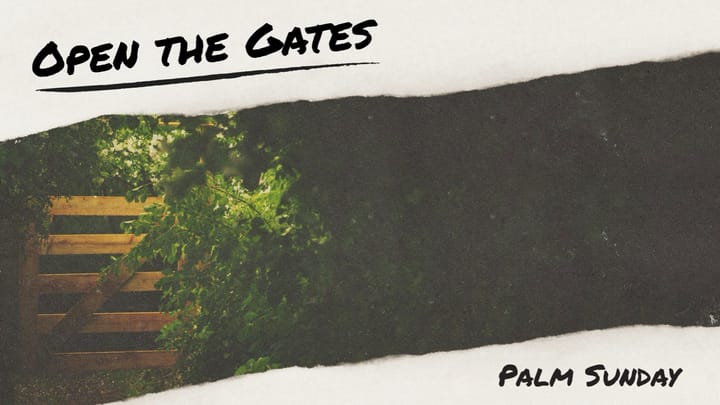Fairhaven Sermon 1-7-2024
This moment of baptism is significant. It's where Jesus, in his humanity, identifies with us. He aligns himself with our own baptismal journeys, sharing in our experiences.

This week's sermon by Pastor Dylan Parson focuses on the baptism of Jesus, contrasting the descriptions in the Gospels of Mark, Luke, and Matthew. It delves into the personal and intimate nature of Jesus' baptism as portrayed in Mark, emphasizing the private encounter among the Trinity. This contrasts with Matthew's depiction of a public event and Luke's more transitional approach.
The sermon reflects on the significance of this moment for Jesus and its relevance to personal faith, highlighting the intimate communication between God and Jesus as a model for individual spiritual experiences. It concludes by encouraging listeners to trust in their own belovedness and relationship with God, as exemplified by Jesus' baptism.
Transcript
So I accidentally picked the wrong gospel passage to preach on today. I pulled from the lectionary and I had us read Mark, which is what Kelly just read, but our Advent series, our Advent Christmas series, How Does a Weary World Rejoice, the whole point of that series was to stick completely in Luke, which has been a good place. You know, we've sought to get this big picture of all the events around Jesus's birth, and so we spent quite a bit of time, more than we usually do, right, with Elizabeth and Zechariah characters that maybe we don't spend as much time with, a good bit of time with Mary and Joseph as well, and in doing so we have found that Christ's conception and birth was a bigger story than one just confined to Mary and Joseph in the Bethlehem manger. There's a whole lot going on here, right? John the Baptist is conceived and is born and points the way to Jesus.
Elizabeth and Zechariah are part of this promise. All their neighbors are invited to come in and celebrate. Like, there's a lot that's going on before we get to this miraculous moment in the manger. The stars are aligning, literally, in the case of one star, and all sorts of elements are coming together in the lead-up to that very first Christmas.
Luke's gospel is just really good at pulling together this comprehensive narrative. It pulls together all these supporting characters and prophecies to arrive at the moment when the Word is made flesh and dwells among us. But as it happens, now that we've gotten past Christmas, Luke does not have a ton to say about the baptism of Jesus. Here's Luke chapter 3 verses 21 through 22, the verses I was supposed to read this morning.
When everyone was being baptized, Jesus was also baptized. While he was praying, heaven was open and the Holy Spirit came down on him in bodily form, like a dove. And there was a voice from heaven, 'You are my Son, whom I dearly love. In you I find happiness.
' And you get the gist of the story here, for sure. You hear basically what happened. In Luke's gospel, the baptism of Jesus seems to function kind of as the end of a prologue. The first three chapters of Luke are sort of the prologue, the big part of the book, which is Jesus's ministry.
And so immediately after the baptism, Luke moves to tell us about the beginning of Jesus' ministry when he was about 30 years old. It begins with his genealogy, from God to Adam all the way down to Mary and Joseph. It's like the baptism is this transition point. This is the moment where Jesus goes out into the world to start this new thing.
It marks the beginning of like the real action for Luke. But here's the beauty of having four gospels. Now every one of them is different. Every one of them tells most stories a little bit differently.
We get a few different angles on most of the events in Jesus' life. And so today, baptism of Jesus, I like Mark. Mark takes this moment in a slightly different direction than Luke does. To me it almost seems like Luke is giving a voiceover like between movie scenes.
So we got all this birth stuff going on and then we have the ministry on the other side, but the screen fades to black. Maybe it's late on some footage of Jesus walking, getting on the road to begin his ministry. We hear about the baptism. It's just kind of this transitional moment.
Mark on the other hand is much more vivid. You can envision almost this hazy slow-motion moment through Jesus' own eyes. Almost as if we could look down and see the water around our own legs of the Jordan. Listen again to Mark chapter 1 verses 9 through 11.
About that time Jesus came from Nazareth of Galilee and John baptized him in the River Jordan. While he was coming up out of the water, Jesus saw heaven splitting open and the Spirit like a dove coming down on him. And there was a voice from heaven, You are my Son whom I dearly love. In you I find happiness.
Let me tell you what feels especially powerful about Mark's version to me. Mark tells it in such a way that it feels like all of this is sort of happening as an internal thing for Jesus. Jesus here is the one who sees heaven splitting open and the Spirit coming down on him like a dove, Mark says. And presumably Jesus is the one hearing this voice from heaven, You are my Son whom I dearly love.
In you I find happiness. Luke's a bit more ambiguous on that and Matthew goes in the complete opposite direction. For Matthew this is a really big public event. He describes the descent of the Spirit, the sound of God's voice, as being addressed to the crowd around the Jordan.
To John, to the crowd, all of this for Matthew is to everybody. And whenever he describes the voice of God, he says, the voice says, This is my Son. As if it's this presentation of Jesus to the world. And Matthew ends God's voice with this last extra line, Listen to him.
God's talking to the people, Listen to him. This is my Son. But Mark, Mark is one on one on one. The Son, the Spirit, and the Father all together, just a moment with them.
You know, Mark's version used to be my least favorite for precisely this reason because it's this very private encounter between just the Trinity, you know, in the midst of the water. And as far as we can tell from Mark, this whole episode could just be a vision solely perceived by Jesus. You know, maybe John isn't even aware that this is all happening. John's inches away from Jesus might literally be still touching his head and he might not know about this.
And so I used to think, What good is that? What good is this big moment if no one else is aware of it? God should be introducing his Son to the world, right? This is his big debut. He steps in the water and then he goes out into ministry. This should be his big break. But you know, the older I get, the deeper I get into my faith and understanding myself, the more I appreciate the quietness of Mark's narrative because it is so much more difficult and so much more intimate.
It's just the Father, the Son, and the Spirit all together. And I don't know if those things are easily separable. Maybe for it to be really intimate, it has to be quiet like this. The great preacher Frederick Buechner, who's worth reading if you never have, his sermons are just beautiful.
Everything he writes is beautiful. He has a sermon where he talks about how we might all wish that God would simply just reveal his existence to everybody. And he says, Wouldn't it be great if God could just write in the stars at night, 'I really exist'? You know, just put it in the stars. I really exist.
Or, God is. Just write it across the sky so everyone can see it. But his conclusion is that if that really were to happen, when it comes down to it, it wouldn't really be helpful. Because in his words, this is Buechner, What we need to know, of course, is not just that God exists, nor that beyond the steely brightness of the stars, there's a cosmic intelligence of some kind that keeps the whole show going.
But there is a God right here, in the thick of our day-to-day lives, who may not be writing messages about himself in the stars, but who in one way or another is trying to get messages through our blindness as we move around down here, knee-deep in the fragrant muck and misery and marvel of the world. And so as beautiful as it is for the father to announce his son to an awaiting world, how much more precious is it for him to speak quietly in Jesus' ear before sending him out to an awaiting world? You're my son, and I love you. I have to imagine that it's a little bit harder for Jesus to stand in the power and the authority given to him by the father if he has to believe it all by himself. It's a harder thing if it's just inside you.
No one else in the general public heard and is able to back him up on what God said. This is all in his heart. But how powerful is that instead? You know, the father and the dove of the Spirit meet him in that baptism. They come to him and they seal him for all that lies ahead.
This is his moment to treasure in his heart. It's a moment of love and confidence to anchor himself in, to reach back to when he's challenged, when he's laughed at by those who can't believe, whether he's at Gethsemane, whether he's at the cross. You know, he can reach back to this moment where the father says, You are my son. In you I find happiness.
That voice of the father, even and perhaps especially, if only Jesus hears it, gives him a reason to trust that he is loved. Now, look, speaking for myself, you know, I've spent much of my life and I think lots of us do this, understanding my worth, my calling from the outside. You know, I most easily process love or, you know, condemnation or even just get an understanding of who I am when it's reflected back at me from other people. That means that I care a lot about whether you like me, right? That means I'm likely to weigh the quality of this sermon by what you all think about it.
But it's a very different thing and one that I'm working on to be able to draw all that from the well of my own soul. To trust that I am who God says that I am. That is to listen to nobody's voice but God's. That's what actually matters and that is what we see in this story.
In this story, in Matthew's telling of it, we see what matters above all is the good word that God gives to you alone in the quiet of your heart, deep in your soul. Whether everyone around you is telling you you're good or bad or important or irrelevant, God's word to you is the same. You are my child whom I deeply love. In you I find happiness.
God loves you. God cherishes you. God has put you here for a reason. God is with you whether you understand that or not.
The dove of the Spirit landed on you at your baptism, dwells with you now. It doesn't matter one bit whether anyone else has heard God say that about you. It doesn't matter that anyone else believes that or not. It's true.
God has said it. And when you come to a moment or a season of challenge, even if it's nothing like Christ's temptation in the desert or his anguish in Gethsemane or his suffering on the cross, what will matter is that you can reach back that anchor and know that God speaks to you with love and means it. Getting through life as a disciple of Jesus demands that you cling to that love no matter what's happening on the outside, no matter what's happening on the inside, no matter what any other voice is saying. Cling to that love.
And it's through prayer, it's through communion, it's through worship that we can cultivate our rootedness in that truth. By reaching out constantly to that love, we can feel it more deeply over and over and over again. So today I ask you, can you trust the belovedness, access the belovedness that God bestows deep in your heart? We'll reach towards it shortly once more, first by remembering our baptism, then by eating at Christ's table. But for now, hear this poem.
This is by the Reverend Sarah Speed. Trust your belovedness. Let it be a protest, an act of resistance, a song of celebration. Trust your belovedness in a world that is rarely satisfied.
Wear it like a badge of honor. Speak it as confidently as your last name. Tattoo it to your heart. When outside forces chip away at your sense of self, when life asks you to hand over the keys, remember the water.
Remember creation. Remember how it was good, so very good. Let that truth hum through your brain, through your veins. Sing it so loud that it drowns out the weariness of the world for the bravest thing we can ever do is trust that we belong here.
In the name of the Father and the Son and the Holy Spirit, amen.


